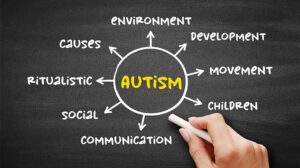ABA therapy, or Applied Behavior Analysis, is a type of therapy that uses positive reinforcement and other behavioral techniques to help people with autism spectrum disorder (ASD) learn new skills and behaviors. This therapeutic approach is uniquely tailored to each individual’s needs. ABA therapist work one on one with clients to promote progress.
From social and communication skills to overall coordination Westside has used ABA therapy to treat a number of children facing various challenges. Westside offers a variety of services that go hand in hand with ABA therapy. Creating individualized plans gives therapists a more in depth understanding of what your child needs to succeed. ABA therapy addresses a variety of challenging behaviors and helps children build their social skills.
What is ABA Therapy & Its Benefits?
ABA therapy is a proven early intervention approach that targets behavioral challenges in individuals with autism spectrum disorder (ASD). Through techniques like functional assessment and behavior management, ABA therapists identify the underlying causes of challenging behaviors and implement evidence-based strategies.
Parent training is an integral part of ABA therapy, equipping parents with skills to support their child’s progress at home. Social skills training and communication skills training foster meaningful interactions, while naturalistic teaching encourages learning in everyday settings. Employing positive reinforcement, ABA therapy reinforces desired behaviors, facilitating social growth and communication development for individuals with ASD.
Common Signs & Symptoms of ASD
Common signs of autism include challenges in social interactions, such as difficulty maintaining eye contact and limited interest in others. Communication skills training may be needed, as individuals with autism may struggle with expressive language or nonverbal communication. Behavior management is vital for addressing repetitive behaviors or sensory sensitivities. Functional assessment helps identify triggers for challenging behaviors. Positive reinforcement and naturalistic teaching aid in skill acquisition. Parent training is essential to extend support at home. Detecting these signs early allows timely intervention to foster a child’s growth and development.
Common things to look for in your child are:
- Difficulty with Social Interactions
- Communication Challenges
- Repetitive Behaviors
- Limited Interests
- Sensory Sensitivities
- Unusual Play Patterns
- Lack of Social Play
- Developmental Delays
ABA Therapy Evaluations
To begin the process, getting a proper evaluation is crucial. Start by consulting a pediatrician or a developmental specialist who can conduct a comprehensive assessment to determine if the child shows signs of autism spectrum disorder (ASD). The evaluation may involve observing the child’s behavior, language skills, social interactions, and developmental milestones. A thorough evaluation is vital in providing an accurate diagnosis and guiding the development of an effective treatment plan.
Finding The Best ABA Services For You
Once a child receives an autism diagnosis, parents and caregivers can begin exploring ABA therapy options. Look for reputable ABA therapy providers or centers with a team of trained and certified professionals. It is essential to choose a provider experienced in working with children on the autism spectrum and familiar with evidence-based ABA techniques.
Effective ABA therapy should involve a multidisciplinary approach, incorporating parent training as a fundamental component. Parents play a crucial role in their child’s progress by implementing ABA strategies at home and in various settings. Parent training equips caregivers with the necessary skills and knowledge to reinforce positive behaviors, generalize skills across different environments, and effectively manage challenging behaviors.
What to Expect When Undergoing ABA Therapy
When your child attends ABA therapy services, expect a tailored approach with one-on-one sessions. Early intervention focuses on social and communication skills training, using positive reinforcement and naturalistic teaching. Behavior management targets challenging behaviors, while functional assessment guides the therapy plan. Parent training empowers you to support progress at home. With intensive sessions, your child will likely see improvements in interactions, communication, and behavior, enhancing their overall development and quality of life.
ABA therapy utilizes your child’s prefer learning style to best teach your child social and communication skills that will stay with them for a life time. By working with your child’s preferred learning approach and using positive reinforcement therapists have been able to create a learning approach that increases your child’s ability to adopt.
ABA Therapy & Positive Reinforcement
Children with ASD often display changes in problematic behavior when undergoing ABA therapy with the implementation of positive reinforcement techniques. Applied Behavior Analysis (ABA) focuses on behavior modification through evidence-based interventions, and positive reinforcement is a fundamental aspect of this approach. By identifying and reinforcing desired behaviors with rewards and praise, children with ASD are motivated to repeat these behaviors, leading to a reduction in problematic actions. ABA specialists tailor the interventions to each child’s unique needs, creating personalized ABA programs that foster positive changes in behavior. Through consistent ABA sessions and reinforcement of adaptive behaviors, children with ASD can develop essential social and communication skills, leading to improved overall functioning and a better quality of life.
Westside is currently offering ABA therapy services at our Plainfield and Wheaton clinics. To speak with someone today, click the button below







